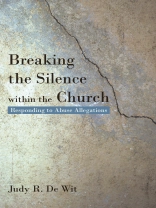Where does abuse come from? is an interesting question that has a difficult answer. However, what this book offers may be the beginning point of finding the answer to that question.
This book starts by helping you understand and identify what approach your parents used with you when you were a child. As you make that determination, you will begin to understand how you became you and why you do the things you do. Whether your parents approach was strict and harsh or was chaotic and slack, determining where your parents were on a continuum will help you understand how you became you. This book explains how certain parenting styles are likely to produce certain traits and characteristics you have as an adult. If Dad or Moms style of parenting was strict and harsh, you are likely to be a perfectionist, suffer from anxiety, and have OCD issues. Its possible you were emotionally and physically abused by them. If your parents had a chaotic style to parenting, its likely you face identity issues and have a difficult time living a structured life. Sexual abuse may have been a part of your growing up years.
Along with this, this book shares how to understand leadership in the church using the same continuum. When church leaders use a harsh and strict way to lead the church, legalism will dominate. When church leaders are promiscuous and slack in their approach, chaos in the church reigns. For both parenting styles and church leadership styles, being in the middle of the continuum flexible – are where families and churches function best.
This book provides a step-by-step process for councils and elders boards should they be faced with having to respond to abuse allegations by a church leader. When councils and elder boards are faced with uncertainty about how to proceed, this book shows how to respond to the complainant, the accused, their families and the entire congregation if such a thing did happen. Determining truth, establishing evidence, investigating allegations, and make determinations of what to do are explained in this book.
Christs mandate for His Church is about bringing healing and restoration to His broken world. The church is never to be an agent of harm or abuse. As leaders, filling that mandate is critical and crucial in obedience to Him. This includes addressing and responding to abuse when it happens in your faith community.
Abuse in the church is real. Abuse in our families is real. No matter what denomination or affiliation you belong to, abuse is happening. Your church is no exception.
So church leaders, what are you going to do when allegations of abuse by one of your church leaders comes to your council table? Your journey about what God wants you to do in your response may begin by whats found in this book.
Judy R. De Wit
Giới thiệu về tác giả
Judy De Wit grew up the youngest of five kids near a small town in Northwest Iowa and is a lifelong member of the Christian Reformed Church. She graduated from Dordt College in 1984 and taught in Christian schools for fourteen years. In 1999, she received her MA in Marriage and Family Therapy from North American Baptist Seminary and became a licensed therapist a short time later. She also is a graduate of Bethel Seminary and has an MA in Theological Studies with an emphasis in Pastoral Care and Counseling. She is currently a student at Northwestern College of Roseville, Minnesota, and is studying Organizational Leadership within the church or nonprofit







![Bìa của Brian Schrag & Julisa Rowe: Community Arts for God's Purposes [Chinese] 貼近神心意的社群藝術 Bìa của Brian Schrag & Julisa Rowe: Community Arts for God's Purposes [Chinese] 貼近神心意的社群藝術](https://static.worldofdigitals.com/thumb_webp/740/9781645083740.webp)




